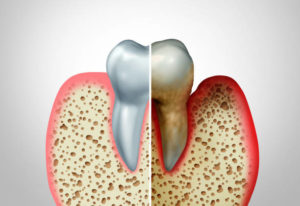No comments yet.
RSS feed for comments on this post.
Sorry, the comment form is closed at this time.
 Have you noticed that your gums are puffy or red? Do they bleed when you brush and floss your teeth? You’re experiencing early signs of gum disease. Gingivitis causes red, swollen, and bleeding gums. Although the symptoms might not appear too concerning, they can quickly lead to tooth loss with no treatment. Not to mention, gum disease can also affect your health negatively. Here’s what you should do if your gums are red or inflamed.
Have you noticed that your gums are puffy or red? Do they bleed when you brush and floss your teeth? You’re experiencing early signs of gum disease. Gingivitis causes red, swollen, and bleeding gums. Although the symptoms might not appear too concerning, they can quickly lead to tooth loss with no treatment. Not to mention, gum disease can also affect your health negatively. Here’s what you should do if your gums are red or inflamed.
Gum disease is an infection caused by poor oral hygiene. Subpar brushing and flossing habits can cause plaque and tartar to accumulate. It can irritate and infect your gums. According to the Centers for Disease Control and Prevention, at least 50% of adults over the age of 30 have gum disease. It can cause a variety of symptoms, including:
Gingivitis can be easy to treat and won’t cause any long-term damage with quick care from your dentist. If left untreated, it can progress to advanced periodontitis, which can lead to tooth loss. The bacteria from the infection can also enter your bloodstream from the pressure of regular chewing, affecting your overall wellness.
Researchers have linked gum disease to various health issues, including an increased risk of heart disease, diabetes, and Alzheimer’s disease. It is even connected to preterm delivery and low birth weights.
Although gum disease is common, you can safeguard your smile by following a few tips:
If you spot any signs of gum disease, don’t wait to contact your dentist. They’ll create a personalized treatment plan to stop the infection in its tracks. They may recommend more frequent cleanings and checkups to monitor your gum health.
About Dr. Matthew Ricke
Dr. Ricke earned his dental degree from the University of Tennessee and has continued his education in various specialties, like cosmetic dentistry, Invisalign, and dental implants. He is an active member of the American Dental Association. Dr. Ricke is passionate about creating healthy, confident smiles using the latest solutions in dentistry. Request an appointment through his website at (919) 781-8610.